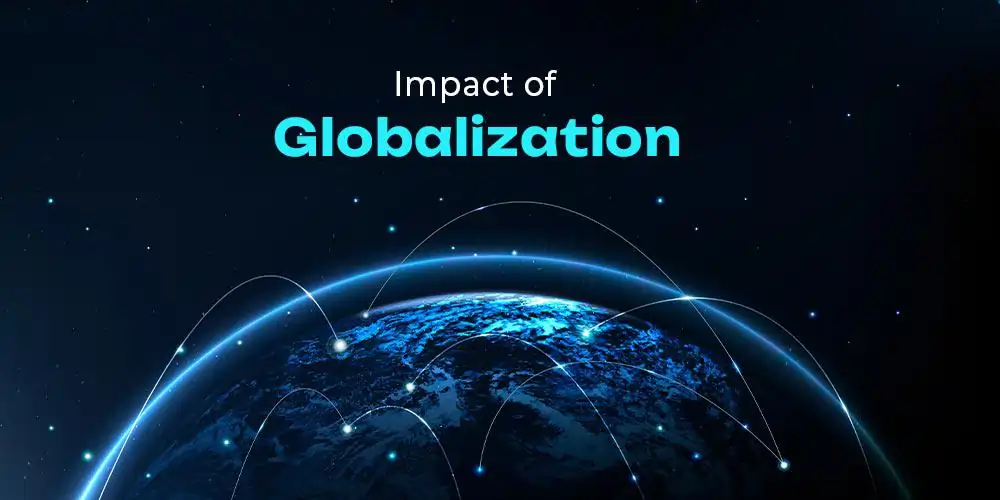Globalization in the contemporary world is a harmonious convergence of nations, where borders blur and connections deepen, fostering interdependence and shared progress. In this global symphony, India embraces its role as a key player, blending tradition and modernity to shape a dynamic and interconnected future.

Globalization is a complex phenomenon that promotes global interdependence and integration by creating networks that transcend economic, social, and geographical boundaries, leading to a world without borders. It encompasses the continuous flow of ideas, capital, goods, and people across different regions of the world, creating and maintaining global interconnectivity. Globalization is multifaceted, with political, economic, and cultural dimensions.
Causes of Globalization
Technology plays a vital role in driving globalization. Innovations like telephones, the internet, and other advancements in communication have made it easier for ideas, capital, goods, and people to move globally. Technological improvements are key to facilitating these movements. Additionally, people’s realization of the interconnectedness of the globe, where events in one region affect others, also drives globalization.
Impacts of Globalization
Political Consequences
Globalization has led to both the weakening and strengthening of state capacities. On one hand, it has diminished the state’s ability to act as a welfare provider, turning welfare states into minimalist states that focus on essential services like law and order rather than economic and social welfare. Multinational corporations have also impacted governments’ decision-making abilities. However, globalization has not always weakened state capacity; in some areas, it has strengthened the state. Despite changes, the state remains the central pillar of political authority, continuing its basic functions while retreating from other areas.
Additionally, technology has enhanced the state’s ability to govern, allowing it to collect more information about its citizens, thereby increasing state power rather than diminishing it. Internationally, old rivalries between countries persist, and the state’s dominance remains vital.
Economic Consequences
Globalization has transformed economies by increasing global trade and reducing restrictions on the movement of goods, capital, and ideas across borders. It has allowed countries to focus on their strengths, leading to higher economic growth and better well-being for large segments of the population. Greater international trade benefits global economies, as each focuses on what it does best. However, the benefits are not equally distributed. Globalization has not resulted in a significant rise in the movement of people, as developed countries continue to safeguard their borders to protect domestic jobs. As a result, while certain segments of the population benefit from globalization, others, particularly those reliant on government services like education and healthcare, may suffer.
Cultural Consequences
Globalization has had significant cultural effects, influencing societies by incorporating elements from different cultures. For instance, wearing a kurta with blue jeans exemplifies cultural heterogeneity, where societies absorb and integrate external influences. While globalization expands cultural options, there is also fear of cultural homogenization, where Western culture dominates and leads to the erosion of local cultures. This phenomenon, referred to as “McDonaldization,” occurs when a politically and economically powerful society imposes its culture on a less powerful one.
However, cultures do not exist in isolation, and foreign influences can either limit or expand cultural choices. These influences might broaden options without necessarily overwhelming traditional practices. For example, the burger is an addition to the menu, not a replacement for traditional foods like masala dosa. While globalization can enrich cultures, there is also concern that it leads to a loss of diverse cultural heritage.
Globalization and India
India has played a significant role in globalization, especially after its 1991 economic reforms. Before these reforms, India followed policies of economic self-reliance and import substitution. However, since then, India has embraced globalization and adopted a more liberalized economic approach, resulting in various changes and opportunities.
Key aspects of India’s role in globalization include:
- Economic Growth: Globalization has significantly contributed to India’s economic growth by attracting foreign investments, expanding domestic industries, and increasing trade.
- Trade and Investments: India actively participates in international trade and has signed bilateral and regional trade agreements, such as the CECA with ASEAN. As a member of the WTO, India engages in multilateral trade negotiations.
- Services Sector: India has emerged as a global hub for services outsourcing, particularly in IT and BPO sectors, thanks to its skilled workforce and cost competitiveness.
- Knowledge Economy: India’s education system has produced a large pool of skilled professionals, particularly in science and IT, contributing to India’s prominence in the global knowledge economy.
- Multinational Corporations (MNCs): Indian companies have expanded globally, contributing to job creation, technology transfer, and economic growth both in India and in host countries.
While globalization has brought many opportunities, it has also posed challenges for India, including increased competition, pressure on traditional industries and agriculture, rising income inequalities, and environmental concerns. India is working to address these challenges while leveraging globalization for sustainable growth.
Conclusion
Globalization involves the movement of ideas, capital, goods, and people facilitated by technological advancements. It has political, economic, and cultural dimensions, each of which shapes global interconnectedness. India, in particular, has embraced globalization, playing an active role in global trade, attracting foreign investment, and positioning itself as a key player in the knowledge-driven economy. While globalization offers numerous opportunities, it also presents challenges, particularly for countries like India as they navigate its complexities in pursuit of inclusive and sustainable growth.

